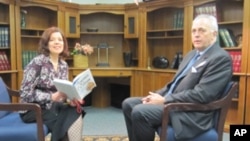Mark Malloch-Brown has been involved in international affairs for more than three decades.
The former journalist-turned-economist served as vice president of the World Bank before being named Deputy Secretary General and U.N. Chief of Staff under Kofi Annan. In that position, he drew controversy for his outspoken criticism of the Bush Administration’s Iraq policy and what he called its "UN bashing."
Now out of public and political office, Malloch-Brown has written a book, "The Unfinished Global Revolution: The Pursuit of a New International Politics."
Tidal wave
Millions of demonstrators filled the streets of Cairo and other cities around the Arab world recently, voicing their opposition to the old order, corruption, inequality and the lack of freedom.
As a former UN official who helped draft the first "Arab Human Development Report" a decade ago, Malloch-Brown says the tidal wave is long overdue.
"The economy was not creating the jobs that the increasingly young inspirational Arab youth wanted,” he says. “That was a hugely popular message, which really touched a chord across the coffee shops and souks and streets of the Arab World, yet the regimes were deaf to this."
Now, he says, the international community has an important role to play as citizens in these countries begin building more democratic political systems.
"In many countries, you would never get successful development, if you didn’t have democracy," he says. “Unless the poor have a vote, have a voice in the affairs of their country, they would never get a fair deal from the country’s rulers they needed. That kind of accountability comes from democracy. So I think it’s hugely important for the international community to provide that support now. They need to do it with a certain modesty and humility which acknowledges that, for years, it has been on the side of stability not democracy. Our job is to help them with the modern tools, let’s say technical assistance to allow Egyptians, Tunisians and others to build their own democracy."
However, moving a nation towards democracy is challenging.
"More often than not, what unites people at the beginning is the common enemy, the regime of Mubarak for example, who they want to see go. But once he's gone, all these groups have very different economic and political agendas. I’m sure we will see initially a very bumpy ride. It will take time to get a decent constitution in place. It will take time for proper parties to form and for elections to produce the kind of coherent results, which will allow a strong reformist government to take office with a clear democratic mandate behind it."
'Unfinished Global Revolution'
In his new book, "The Unfinished Global Revolution," Malloch-Brown shares his experiences as both witness to and participant in the process of democratization and globalization. Part autobiography, part political tract and part history, the book also offers a vision for the future, in an increasingly globalized world.
"You could no longer just - within the national boundaries of your own country - fix and manage your banking sector,” he says. “Your banking sector was intimately linked with global banks. And unless they too were regulated, you couldn't protect your banks against the storms of the financial crisis. Similarly, the public health of your people is no longer just a national issue. We saw it with the way, two years now, the flu strain started in Mexico, but came through Kennedy Airport and other air connections straight to the U.S. and from there quickly spread across the world."
He says the world needs to find global solutions to what are global issues.
"National governments have to learn how to arrive at those solutions, how to share a little bit of each other’s sovereignty and negotiate and compromise to find global public policy solutions," he says. "This isn't easy. National governments are very protective."
But, he says, that does not mean the world needs a global government.
"The last thing you want to do is create some global government version of the national governments, some great, big, unaccountable edifice. I don’t believe in that at all."
To complete the global revolution, Malloch-Brown says the world needs to redefine the U.N.’s role and involve voices from a broad range of civil society.
"What I've seen in my career is all global problems, which have been successfully tackled in recent years, it's not just been states that have done it. It's usually been because a bunch of social activists from non-governmental community, foundation chiefs, business leaders and others have joined in to drive policy forward."
Malloch-Brown challenges private citizens everywhere to play a role in the global revolution and become a force for change.














